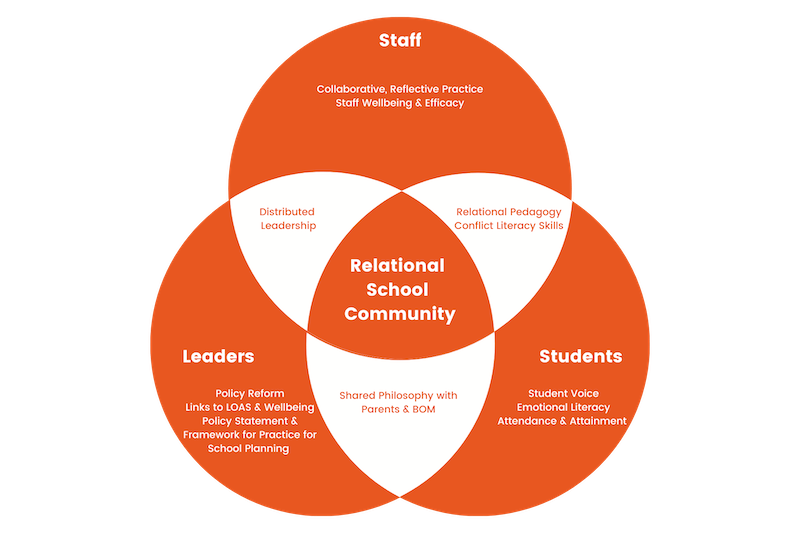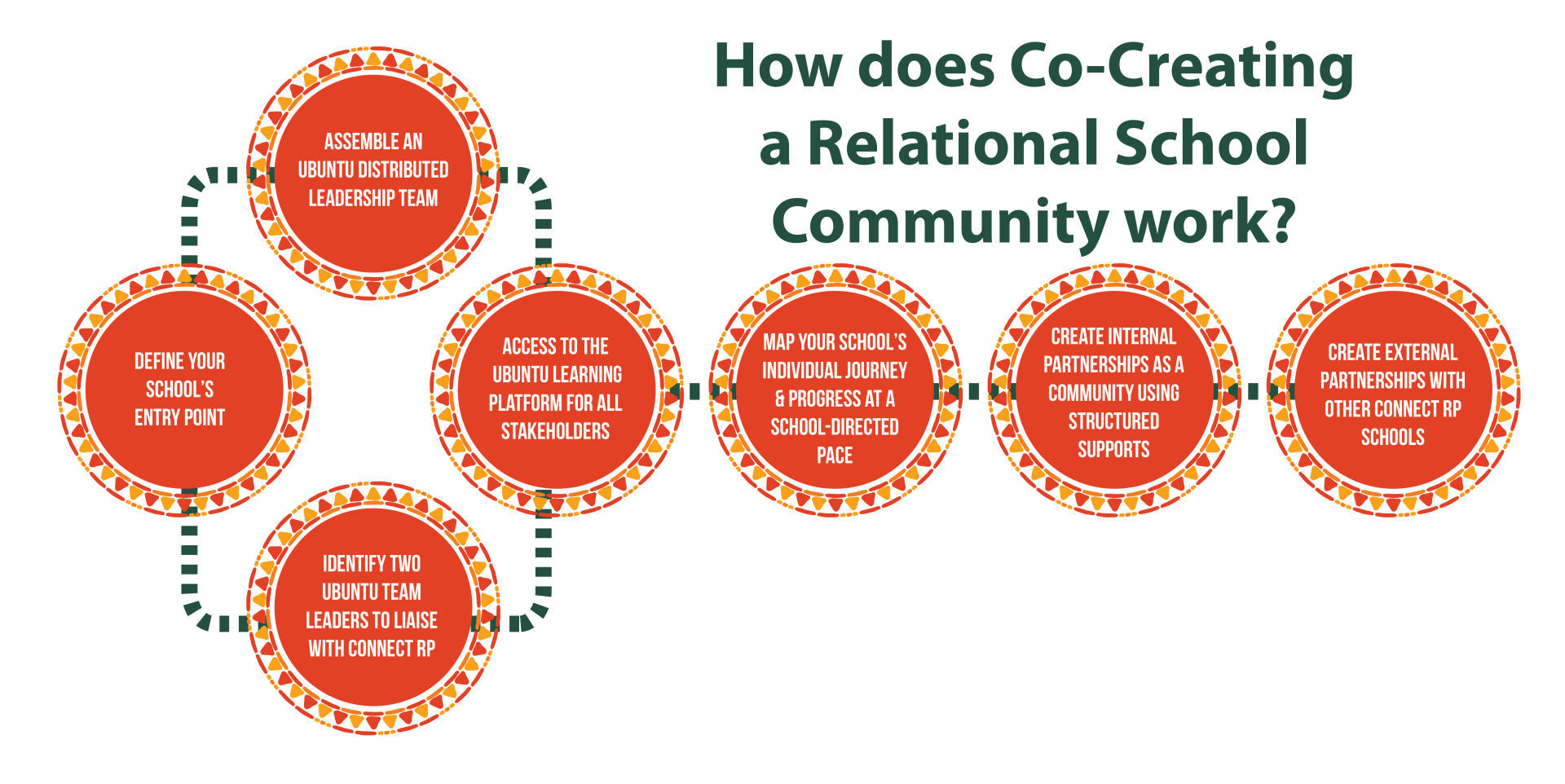WHOLE SCHOOL
Growing a restorative school is about embracing and living the restorative philosophy; which is based on a shared awareness that we are all profoundly relational, interconnected and inherently good. Ultimately, it is about creating relational learning communities and cultivating whole-school preferred practices that honour this understanding. Our Connect RP Site Licence was created to support schools seeking to go on such a journey, offering resources, implementation pathways and ongoing supports.
Connect RP Site Licence
Moving from intention to everyday practice.
Moving from this intention to everyday practice involves progressing Restorative Practice (RP) beyond a narrative that centres around ‘behaviour management’ and CPD training sessions for staff, towards a holistic whole-school approach that offers a transformative experience for schools and the communities they serve – cultivating relational learning communities. A Connect RP Site Licence aims to offers a Connect RP Implementation Model that support school communities with this restorative vision and intention whether they are beginning their restorative journey or committing to accelerate the growth of their restorative culture.
Co-Creating a Restorative School Community
Our three pillars grow the internal capacity to grow a restorative culture within your whole-school community cultivating 3 systemic enablers - awareness (Do we want to change?), growth (Do we know how to change?), and sustainability (Do we have the opportunity to change?)
Ubuntu Learning Platform
Bus
Access to collective, community and individual courses, resources and supports at a school-directed pace from - CPD webinars, self-paced courses and resources for teachers and SNAs, and RP for Students/ Parents/ BOM that culminate as a constant reservoir for your whole-school community; Offering an opportunity to connect to the key concepts, support the restorative paradigm shift through reflective practice, and scaffolding resources for relational pedagogy and positive communication.
Whole School Implementation Pathways
Map
Moving beyond a ‘train and hope’ model and instead offering a school ongoing implementation pathways to light the way towards growing a restorative school community in policy and practice. We link our Connect RP Site Licence with quality implementation frameworks to support big picture thinking and consistent iterative action planning. Our pathways range from structured student curriculum programmes, school-led initiatives such as Love Bomb Week, and our weekly invitation to focus on a quest, quote, reflection or resource within our Connect RP Twinkle emails for staff.
Partnerships
Drivers
An internal UBUNTU (distributed leadership) Team is the heart of the Connect RP Site Licence; supported with ongoing Connect RP Mentorship & other school partnerships. Connect RP is with you every step of the way via our UBUNTU team planning & implementation sessions; facilitating partnerships with other Connect RP schools via our monthly UBUNTU Team Leader Community Café, our guided Professional Learning Communities, our Lead Facilitator Training days; and also offering international partnerships in our Connect RP e-Conference and UBUNTU Team Training Sessions.
BENEFITS
A structured approach with everything you need to support your school community to grow and develop a Restorative TEAM; building internal capacity, leadership and sustainability.

UBUNTU Learning Platform
For RP to be an authentic lived experience, it is important that schools embrace the proactive relationship and belonging building aspect of the philosophy, understanding that the intention is not to ‘fix or manage behaviour’ but to create relational learning communities where we feel seen, heard and connected – this platform seek to connect with and offer the whole school community this relational lens and to facilitate relational learning experiences for the community who avails of the courses and resources. It is supports the capacity for authentic policy reform which should only occurs when all stakeholders have had an opportunity to understand RP and to develop their skills and capacities in order for educators to have an alternative to a punitive system. Otherwise, we run the risk of people feeling disarmed, unsupported and frustrated. Developing our relational thinking and conflict literacy skills by offering ongoing support, and upskilling staff to cultivate whole-school preferred practices and processes over time is key. The UBUNTU learning platform facilitates the inclusion of every member of the community to engage with this restorative journey, honoring the guiding restorative principle of ‘nothing FOR us WITHOUT us’!
Whole-School Implementation Pathway & Team
To grow the capacity for sustainable change we need to replace the concept of training days or a ‘train and hope’ model with a Connect RP Implementation Model which offers long-term school-directed implementation pathways. The heart of this, and undoubtedly the biggest enabler for growing a restorative school, is the creation of a distributed restorative leadership team, purposefully co-creating such a shared vision within the community they serve – an UBUNTU team!
Ongoing Mentorship Through Connect RP & School Partnerships
Connect RP’s experience and is with schools every step of the way, not only through the UBUNTU Learning Platform but each school’s UBUNTU team is directedly guided by Connect RP in their school planning workshops and the UBUNTU Team Leaders are continuously supported via our monthly Restorative UBUNTU Leader Community Caféswhere we grow our skills and capacities over time and link in with other schools on a similar journey to facilitate a co-learning and co-mentoring experience. This is a hive of the relational learning community created in order to support schools to map, nurture, guide and co-create a school-paced journey.
Without this ongoing support, research illustrates that schools tend to co-opt the practices to reinforce the hierarchical structures we are seeking to move away from. RP is not ‘do as I say but I’ll ask you nicely’ as it can be sometimes misconceived. It is in essence about cultivating a space where empathy, connection and accountability are cultivated and the ongoing mentorship where we move beyond theory towards reflecting on the practice in our everyday schools and how the UBUNTU platform and implementation pathways can support us is key!
“The Connect RP Site Licence and Ubuntu Learning Platform have been continuously guiding us in the school through our RP journey. Is it a practical and accessible tool that we regularly draw on as a team for our team meetings, community gatherings, our own professional development and in supporting our students. The Relationship Keeper programme is being successfully run with all our junior year groups. The students love the content and structure and find it relevant and approachable. All our team have completed the Restorative Me course which has given us an excellent foundation as a restorative school. Michelle continues to guide us as an ever-present support and has helped us to establish our own strong Ubuntu team which keeps us connected to our RP journey in the school. It’s an invaluable tool!”
Sarah Healy, UBUNTU Team Leader, Firhouse ETSS.
At the start of the 2020/21 year, we at Shinrone NS signed up tos Connect RP Site Licence using the Ubuntu platform provided by Connect RP. We understand that RP is a process, a practice, a journey; not a 'once-off training'. For us, signing up to the Ubuntu Platform has been a tremendous scaffold on this journey. The platform has helped us build a Professional Learning Community among staff where we support each other on our Journey. The Ubuntu Team leaders on staff have found the monthly RP Café experience to be a fantastic support also. It is wonderful to be able to share ideas with other schools in a safe space. Thank you Michelle!
Shinrone National School, Caitriona Cuillinane (Principal)
Enter your details below to access our webinar for more information.
We take your privacy very seriously and will only use your details to send you your free resources and relevant follow up emails. You can unsubscribe at any time. To see how we process your data, please refer to our Privacy Policy.
Common Questions
- How long will this journey take?
Most research states that becoming a restorative school can take up to five years an beyond but in my experience it is an ongoing commitment and relationship. Like all relationships it requires an ongoing commitment and investment to our greatest resource of all – our time and energy. Every school will have a different starting point of course and the intention to to build internal capacity and sustainability within each school.
- How long do you have access to the platform for?
As long as you hold a current Connect RP Site Licence you can access the UBUNTU Learning Platform and ongoing mentorship of Connect RP - the ongoing aim of which is to build internal capacity and sustainability. The platform is an organic and live one, it seeks to iterate to meet the ongoing needs of the community it serves and to evolve alongside them. It also offers renewables such as staff induction supports and the student curriculum courses etc. that may be beneficial for school to have access to on an ongoing basis.
- Who should be on the UBUNTU Team?
A team can be from 4-10 people. It is recommended that the team is made up of these interested or curious about developing their own practice and potentially promoting it within the school community in a purposeful and committed way. Schools can use an existing structure such as a care or wellbeing team. Sometimes schools use an existing leadership team which can work well as there is often time to come together knitted into the timetable. But schools need to also remember that the emphasis here is on our own practice and also supporting the growth of RP within the school community. There will be many opportunities for others who are interested in RP to get involved without being a member of the UBUNTU team itself. It can be helpful to have people from different range of experience and roles on a team, people who believe in and are willing to commit to developing their relational practice and in supporting others to do the same.
- Who may be best placed to lead the team?
It is ideal to have two UBUNTU team leaders who have the unique role of consistently communicating with me and team leaders in other school communities. Someone who has the interest and time to lead is really essential, someone who can and is willing to prioritise RP. I recommend that this is typically not a direct member of the senior leadership who may be on the team or act as a third team leader, but will have many other competing roles already but someone who has more flexibility and time to connect with me and consistently prioritise the promotion and leadership of this team within the school. Someone who has or is interested in actively cultivating positive and warm relationships with staff is also key.
- Do we need to get rid of punishments and consequences?
If we do this without allowing educators to attach their own meaning to the practices or to develop relational thinking and conflict literacy skills we run the risk of people feeling disarmed, unsupported and frustrated. It is essential to offer ongoing support, and upskilling staff to cultivate whole-school preferred practices and processes over time that offer a needed but systemic alternative to a punitive approach. It is important to iterate so that policy is authentically reflective of our operational culture and vice versa – where our values and actions and policy match!
- When/how do we change policy?
There can be an initial urgency in schools to add RP into an existing code of conduct before developing people’s capacity to live the practice. This involves allowing people to attach their own meaning to the practices and to grapple with the paradigm shift - moving away from blame and punishment, towards empathy and accountability. It may be healthier for a school, in the early stages of this journey, to consider itself a school committed to RP as opposed to a fully restorative school. At the heart of this is the recognition that schools are a sum of all their parts, allowing an authentic restorative progression at a school’s own directed pace working WITH the community. A fully restorative school would have a relationship policy which would need to evolve over time, one that has the restorative values at its core and honours relationships over rules. An important first step in policy reform may be to acknowledge this growing commitment and to outline the restorative values explicitly in the school’s policy.


